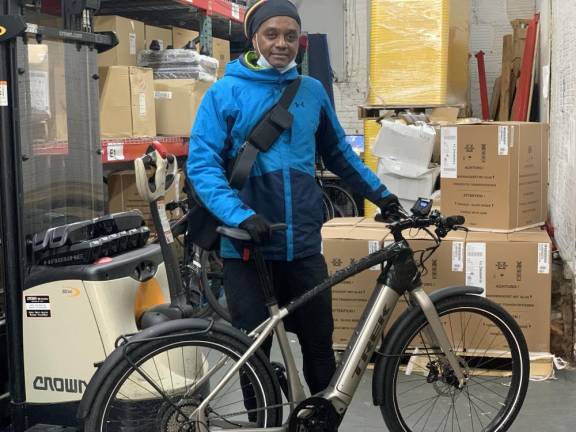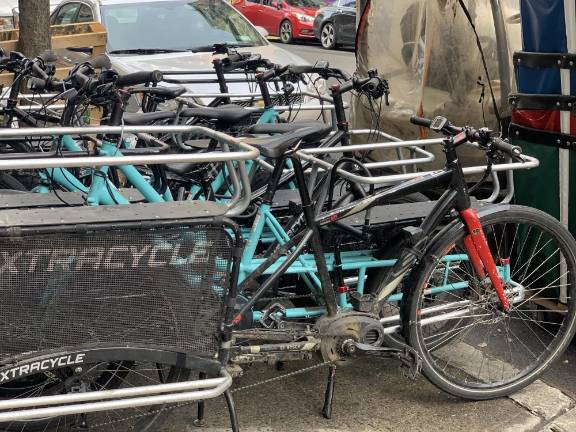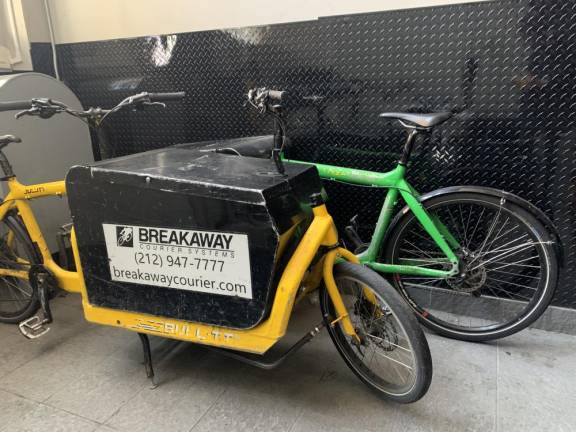It’s a chilly Thursday morning, the New York metro area buzzing with commuters in SUVs and Subarus. Rob Kotch sits in the office of Breakaway Courier Systems, the transportation company he founded in 1990. Housed in a converted warehouse on West 36th Street, the building is filled with electric bicycles and merchandise to be delivered.
Nearly every day for over two decades, Kotch has commuted 20 miles via bicycle from Ridgewood, NJ, to Midtown Manhattan. He loves bicycles and was previously a bike messenger himself; founding Breakaway allowed him to be his own boss. However, traditional bike courier services have been in decline for years.
“Bike messengers are a dying breed,” Kotch says right up front. “The classic bike messenger is about five percent [of my staff] [compared to] its heyday in the 1990s.” Like many similar companies, Breakaway now makes more deliveries using cars than bikes.
Their core staff of career bike messengers remains. Veteran rider Curtis Phillip, originally from Trinidad, has been making deliveries via bike for Breakaway for more than 20 years. Arriving back in the office after a morning delivery, Phillip smiles as he talks about his work. “It’s freeing. I’m my own boss, I’ve just got to do my job right.”
In New York City, that job is far from boring. Phillip describes delivering “fashion stuff, a lot of architecture stuff,” as well as bulky objects such as lamps and baby car seats that barely fit on his bike. As a career rider, he knows Manhattan through and through. The West Village is his favorite neighborhood to ride through, Wall Street his least favorite.
Phillip’s current ride, an electric bicycle, travels up to 30 mph. Though it’s worth thousands of dollars, he wraps the crossbar in duct tape to make it look less fancy. “I make it look old, so nobody steals it,” he says. “In New York, if they want it, they take it.”
Asked if he was a great cyclist before taking this job, Phillip laughs. “I was pretty good, but this is a different kind of cycling. This cycling, it’s crazy.”
While the classic image of the job remains one of adrenaline-filled, fast-paced NYC hustle, there’s a pervasive sense that this industry’s best years are over. Several Breakaway employees roll their eyes when I say I am interested in writing about bike messengers. “Everybody romanticizes the bike messenger,” says Kotch. To hear him tell it, that romantic image is directly at odds with the real-life job and its uncertain future.
Dangers of the Road
Navigating Manhattan’s busy streets at top speed for a living has always come with its risks. The 2011 reality series “Triple Rush” featured riders for Breakaway and other courier companies weaving in and out of New York City garbage trucks, motorcycles and pedestrians, in constant danger of getting “doored” by passengers exiting cars.
“Doors open on you,” confirms Phillip. “The taxicabs pull across the street to get a passenger. All that, you’ve got to watch.”
“[I’ve gotten doored] plenty of times. [On] 55th between Eighth and Ninth, I got doored and broke my fingers,” he says nonchalantly. “Walked straight to the hospital down there.”
While both drivers and pedestrians in New York often complain about cyclists on the road, bike messengers — arguably at greater risk of injury — focus on their own task at hand.
“None of them [pedestrians or cars] bother me,” says Kotch. “A true seasoned bike messenger, nothing bothers him because he has a high level of riding skill. He knows how to handle all that. A bad bike messenger is someone who loses his temper. A bad bike messenger is somebody who can’t navigate through a sea of pedestrians or a sea of cars.”
Industry Challenges
While veteran riders have learned to handle the turbulence of New York, the industry itself has struggled in recent years. Breakaway is pushed further away from its traditional, bicycle-focused business model each year.
An obvious challenge has come from the digitization of information. While in their heyday couriers ferried legal documents and checks across town, nearly all such documents can now be transferred digitally. “Our bread and butter pre-internet was documents with information,” Kotch says. “We don’t deliver information anymore.”
Kotch adds: “The only thing left is food and clothes ... and none of that is urgent.” says Kotch. If an item isn’t urgent, “no one wants to pay 25 dollars for a delivery. They want to pay five dollars. So the only way to do that is to have what’s called delivery density. That means deliveries per hour.” Paying minimum wage or slightly above, prices for the customer inevitably rise: “You’re doing two deliveries an hour, you’ve got to charge the customer like 40 bucks or something.”
A bigger challenge, however, comes from a new adversary. Over the last few years, Breakaway and its competitors have struggled against the Goliaths of the gig economy — UberEats, Postmates and DoorDash. Breakaway’s riders are classed as employees, and therefore by law must be paid minimum wage plus benefits. Further, because their work can be dangerous, insurance premiums are high; this cost only adds to the price tag of a bike messenger. Delivery apps have largely avoided these problems by sidestepping them: by classing their riders as “independent contractors,” they need not provide the same benefits.
Because their riders are employees, the price of Breakaway’s services has a relatively high floor. By contrast, UberEats can cut rates far below theirs and face no consequences.
Postmates Lawsuit
2020 saw a case in New York State’s highest court which in theory should have been a stroke of good fortune for bike messenger services. Matter of Vega involved Luis Vega, a courier for the delivery app Postmates. Vega had tried to file for unemployment benefits, but found himself blocked: he was not considered an employee, but an independent contractor, and thus ineligible for unemployment.
The court ruled in Vega’s favor, setting a precedent that couriers for such apps are employees and not independent contractors. An online legal summary of Vega states that this “reclassification of gig economy workers” would mean that the big apps have to provide workers’ comp and other benefits, which would “significantly reduce their economic advantage over traditional competitors.”
It’s easy to see how important this ruling could have been to the industry. If app messengers are employees, then UberEats must pay them minimum wage plus benefits, raising their costs closer to those of a smaller business like Breakaway and allowing for fair market competition. However, Kotch says the big apps have simply ignored the ruling.
“The big issue ... is the NY Labor Department not enforcing its own f—ing laws,” says Kotch. “What did Postmates do? They punted. They sold their company to Uber.” Uber, in turn, continues to treat its riders and drivers as independent contractors, despite the legal precedent prohibiting this. Kotch says the sheer size and power of companies like Uber allow them to evade the law. For one thing, they can afford years of legal costs while they battle it out in court; a smaller business, meanwhile, has no choice but to obey the ruling.
“Government institutions that we’ve depended on to have a civilized society are no longer enforcing the laws,” he says.
In 2016, Kotch joined a class-action lawsuit against Uber, demanding it protect its employees and stop undercutting the competition. So far, however, he has met with little success.
Facing the digitization of communication and the delivery-app competition, Kotch often seems pessimistic about the future. “It’s a dead, dying business,” he says, though he acknowledges the market niches they have shifted to occupy; for instance, as a “last mile” delivery service, getting products from retailer to consumer or from airport to customer.
But Phillip remains more bullish on the future of his work and says he plans to continue cycling. “I think I’ll keep my fingers crossed,” he says. “I ain’t going nowhere.”
“Our bread and butter pre-internet was documents with information. We don’t deliver information anymore.” Rob Kotch of Breakaway Courier Systems


